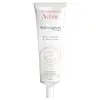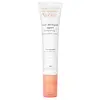What's inside
What's inside
 Key Ingredients
Key Ingredients

No key ingredients
 Benefits
Benefits

 Concerns
Concerns

 Ingredients Side-by-side
Ingredients Side-by-side

Water
Skin ConditioningCaprylic/Capric Triglyceride
MaskingPropylene Glycol Dicaprylate/Dicaprate
EmollientPentaerythrityl Tetracaprylate/Tetracaprate
EmollientGlycerin
HumectantGlyceryl Stearate
EmollientButylene Glycol
HumectantCetearyl Alcohol
EmollientStearic Acid
CleansingButyrospermum Parkii Butter
Skin ConditioningDimethicone
EmollientAmmonium Acryloyldimethyltaurate/Vp Copolymer
Benzoic Acid
MaskingCeteareth-33
CleansingDextran Sulfate
Skin ConditioningDimethiconol
EmollientDisodium EDTA
Hesperidin Methyl Chalcone
AntioxidantPhenoxyethanol
PreservativeRuscus Aculeatus Root Extract
AstringentSodium Hydroxide
BufferingTocopheryl Acetate
AntioxidantWater, Caprylic/Capric Triglyceride, Propylene Glycol Dicaprylate/Dicaprate, Pentaerythrityl Tetracaprylate/Tetracaprate, Glycerin, Glyceryl Stearate, Butylene Glycol, Cetearyl Alcohol, Stearic Acid, Butyrospermum Parkii Butter, Dimethicone, Ammonium Acryloyldimethyltaurate/Vp Copolymer, Benzoic Acid, Ceteareth-33, Dextran Sulfate, Dimethiconol, Disodium EDTA, Hesperidin Methyl Chalcone, Phenoxyethanol, Ruscus Aculeatus Root Extract, Sodium Hydroxide, Tocopheryl Acetate
Water
Skin ConditioningParaffinum Liquidum
EmollientCaprylic/Capric Triglyceride
MaskingGlycerin
HumectantPEG-12
HumectantGlyceryl Stearate
EmollientPEG-100 Stearate
1,2-Hexanediol
Skin ConditioningCaprylyl Glycol
EmollientCarbomer
Emulsion StabilisingDisodium EDTA
Ribes Rubrum Fruit Extract
TonicRubus Idaeus Fruit Extract
AstringentSodium Benzoate
MaskingSodium Dextran Sulfate
Gel FormingSodium Hydroxide
BufferingTocopheryl Glucoside
EmollientVaccinium Myrtillus Fruit Extract
Skin ConditioningWater, Paraffinum Liquidum, Caprylic/Capric Triglyceride, Glycerin, PEG-12, Glyceryl Stearate, PEG-100 Stearate, 1,2-Hexanediol, Caprylyl Glycol, Carbomer, Disodium EDTA, Ribes Rubrum Fruit Extract, Rubus Idaeus Fruit Extract, Sodium Benzoate, Sodium Dextran Sulfate, Sodium Hydroxide, Tocopheryl Glucoside, Vaccinium Myrtillus Fruit Extract
Ingredients Explained
These ingredients are found in both products.
Ingredients higher up in an ingredient list are typically present in a larger amount.
This ingredient is an emollient, solvent, and texture enhancer. It is considered a skin-softener by helping the skin prevent moisture loss.
It helps thicken a product's formula and makes it easier to spread by dissolving clumping compounds.
Caprylic Triglyceride is made by combining glycerin with coconut oil, forming a clear liquid.
While there is an assumption Caprylic Triglyceride can clog pores due to it being derived from coconut oil, there is no research supporting this.
Learn more about Caprylic/Capric TriglycerideDisodium EDTA plays a role in making products more stable by aiding other preservatives.
It is a chelating agent, meaning it neutralizes metal ions that may be found in a product.
Disodium EDTA is a salt of edetic acid and is found to be safe in cosmetic ingredients.
Learn more about Disodium EDTAGlycerin is already naturally found in your skin. It helps moisturize and protect your skin.
A study from 2016 found glycerin to be more effective as a humectant than AHAs and hyaluronic acid.
As a humectant, it helps the skin stay hydrated by pulling moisture to your skin. The low molecular weight of glycerin allows it to pull moisture into the deeper layers of your skin.
Hydrated skin improves your skin barrier; Your skin barrier helps protect against irritants and bacteria.
Glycerin has also been found to have antimicrobial and antiviral properties. Due to these properties, glycerin is often used in wound and burn treatments.
In cosmetics, glycerin is usually derived from plants such as soybean or palm. However, it can also be sourced from animals, such as tallow or animal fat.
This ingredient is organic, colorless, odorless, and non-toxic.
Glycerin is the name for this ingredient in American English. British English uses Glycerol/Glycerine.
Learn more about GlycerinGlyceryl Stearate is a mix of glycerin and stearic acid.
It is used to stabilize the mixing of water and oil ingredients. By preventing these ingredients from separating, it can help elongate shelf life. It can also help thicken the product's texture.
As an emollient, it helps soften skin and supports barrier-replenishing ingredients.
In cosmetics, Glyceryl Stearate is often made from vegetable oils or synthetically produced.
This ingredient may not be fungal-acne safe
Fun fact: The human body also creates Glyceryl Stearate naturally.
Learn more about Glyceryl StearateSodium Hydroxide is also known as lye or caustic soda. It is used to adjust the pH of products; many ingredients require a specific pH to be effective.
In small amounts, sodium hydroxide is considered safe to use. However, large amounts may cause chemical burns due to its high alkaline.
Your skin has a natural pH and acid mantle. This acid mantle helps prevent harmful bacteria from breaking through. The acid mantle also helps keep your skin hydrated.
"Alkaline" refers to a high pH level. A low pH level would be considered acidic.
Learn more about Sodium HydroxideWater. It's the most common cosmetic ingredient of all. You'll usually see it at the top of ingredient lists, meaning that it makes up the largest part of the product.
So why is it so popular? Water most often acts as a solvent - this means that it helps dissolve other ingredients into the formulation.
You'll also recognize water as that liquid we all need to stay alive. If you see this, drink a glass of water. Stay hydrated!
Learn more about Water